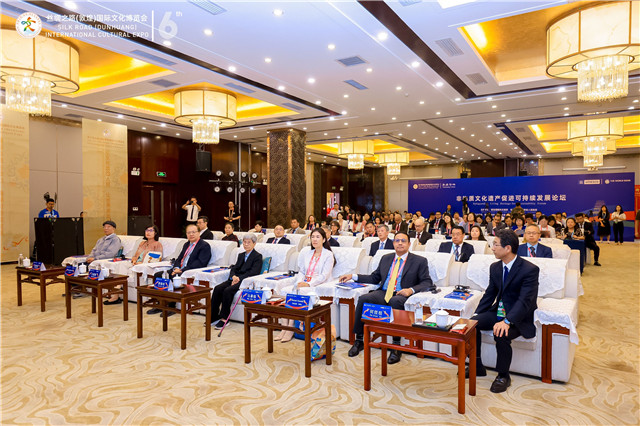Forum on safeguarding live heritage held during 6th Dunhuang cultural expo

The Safeguarding Live Heritage for Sustainability Forum was held in Dunhuang, Gansu province on Sept 7. [Photo provided to gogansu.com]
On Sept 7, the Safeguarding Live Heritage for Sustainability Forum was held in Dunhuang, Gansu province, during the Sixth Silk Road (Dunhuang) International Cultural Expo.
Sponsored by UNESCO, the World Bank and the Gansu provincial government, the event gathered experts, scholars, inheritors, and government representatives from 12 countries and regions.
At the opening ceremony, renowned Chinese archaeologist Fan Jinshi was recognized by UNESCO for her outstanding contribution to protecting the Dunhuang Mogao Caves, which became a UNESCO World Heritage Site in 1987.
Prof. Shahbaz Khan, director of the UNESCO Multisectoral Regional Office for East Asia, delivered a speech via video link. He pointed out that this year marks the 20th anniversary of the signing of the UNESCO Convention for the Safeguarding of Intangible Cultural Heritage and the 10th anniversary of the Belt and Road Initiative. At present, the top priority is to join hands to cherish and protect intangible cultural heritage and ensure that they survive and thrive in modern society.
Wang Chenyang, director of the intangible cultural heritage department of the Ministry of Culture and Tourism, gave an instruction on the Chinese government's efforts and experience in cultural heritage protection.
Wang said that since China joined the Convention in 2004, it has conscientiously fulfilled its obligations. It has declared 43 intangible cultural heritage items to be included on the list of items in urgent need of protection, the list of representative works and the list of outstanding protection practices. In addition, China has served as a member of the Intergovernmental Committee for the Safeguarding of Intangible Cultural Heritage three times, and established the Asia-Pacific International Training Center on Intangible Cultural Heritage of UNESCO in Beijing, providing training services for 41 countries and regions.
He added that the central government has invested a total of $1.43 billion in the country's intangible cultural heritage protection programs. The heritage inheritor training program has attracted more than 100,000 participants. Also, efforts have been made to build more than 2,500 workshops to help rural people increase their income through making handicrafts.
Ahmed Eiweida, World Bank Global Coordinator for Cultural Heritage and Sustainable Tourism, pointed out that the World Bank will support Gansu to accelerate its integrated and innovative development of local cultural tourism from three aspects: urban and rural cultural heritage restoration, micro-loan financial support, institutional capacity building and global knowledge sharing.
During the event, attendees were offered a range of domestic and international intangible cultural heritage performances.
Copyright © Lanzhou City, Gansu Province.
All rights reserved. Presented by China Daily.
Copyright © Lanzhou City, Gansu Province. All rights reserved. Presented by China Daily.




